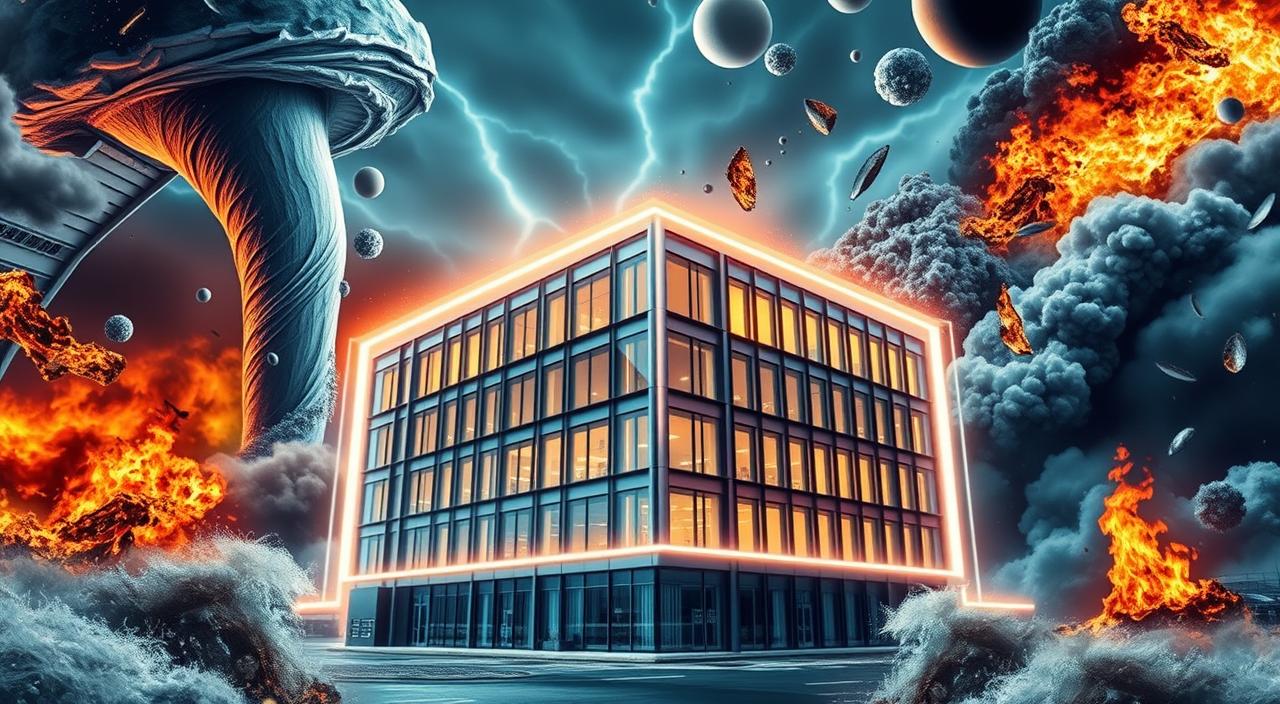Did you know 40% of small businesses never reopen after a natural disaster? This is a shocking fact that shows how vital business insurance is. Business hazard insurance, or commercial property insurance, is key for companies of all sizes. It protects your most valuable assets from unexpected events.
Business hazard insurance covers your commercial building, equipment, inventory, and more. It helps you bounce back from damages like fires, theft, and water damage. This includes damage from lightning strikes, explosions, and vehicle collisions.
Whether you own or rent your business space, hazard insurance is a must. It keeps your company safe and running smoothly. As your business grows, make sure to check your insurance often. This ensures you have the right coverage for your needs.
Key Takeaways
- Business hazard insurance protects your commercial property and assets from a wide range of unexpected events.
- This coverage can help you repair or replace damaged equipment, inventory, and other essential business property.
- Hazard insurance is a requirement for obtaining an SBA loan and can be a critical safeguard for small businesses.
- The cost of hazard insurance varies based on factors like your property value, industry, and company size.
- Regularly reviewing your coverage ensures you maintain adequate protection as your business grows.
What Is Business Hazard Insurance?
Business hazard insurance, also known as commercial property insurance, is key for protecting a business’s physical assets. It covers a company’s building, equipment, inventory, and more from damage. This includes fire, theft, and natural disasters.
Definition and Purpose
The main goal of hazard insurance for business is to help a company bounce back after unexpected events. It offers financial protection for a business’s assets. This way, a company can get back to normal quickly after a loss.
Key Coverages
Commercial hazard insurance includes several important coverages:
- Building coverage: Protects the physical structure of the business premises.
- Business personal property: Covers the replacement or repair of equipment, furniture, inventory, and other assets.
- Loss of income: Provides financial support to help the business maintain operations and cash flow during a covered disruption.
- Additional coverages: May include protection against liability claims, professional errors and omissions, and other specialized risks.
Knowing what’s hazard insurance and its main benefits helps businesses protect their operations and assets.
Difference Between Business Hazard Insurance and Homeowners Insurance
Hazard insurance and homeowners insurance both cover property damage. But they serve different purposes. Homeowners insurance protects a home and its contents. On the other hand, business hazard insurance covers a company’s property, equipment, and inventory.
Homeowners policies might not fully cover a home business. In these cases, a business hazard insurance policy is needed. It ensures a company’s property is fully protected.
| Hazard Insurance | Homeowners Insurance |
|---|---|
| Covers commercial property, including buildings, equipment, and inventory | Covers the structure of a residence and personal belongings |
| Protects a business’s commercial assets | Primarily protects a homeowner’s personal property |
| May be required for businesses, including home-based ones, to obtain adequate coverage | Typically provides limited coverage for home-based businesses |
In summary, hazard insurance and homeowners insurance both protect against property damage. But they serve different needs. Businesses need business hazard insurance to protect their commercial assets.
Do You Need Business Hazard Insurance?
Many states don’t require businesses to have hazard insurance. But, it’s smart to protect your assets. Without it, you’ll have to pay for repairs or replacements after events like theft or fire. Business hazard insurance is also needed for an SBA loan to protect the lender’s investment.
State Requirements
Even if your state doesn’t require it, getting business hazard insurance is wise. It protects your property and lets you quickly get back to work after a loss. It covers damage from fires, theft, and more.
Protecting Your Business Assets
Business hazard insurance helps pay for fixing or replacing damaged items. This includes equipment, inventory, and buildings. Without it, a single event could harm your business and its future.
| Coverage Inclusions | Coverage Exclusions |
|---|---|
|
|
Even if your state doesn’t require business hazard insurance, it’s key to protect your assets. Talk to an insurance provider to find the right coverage for your business.
Business Hazard Insurance for SBA Loans
To get an SBA loan, your business needs good hazard insurance. This protects the SBA’s money in your company. It makes sure your stuff is safe if it gets damaged or lost.
Most SBA loans need a commercial property insurance policy. This policy must cover a certain amount of money.
SBA Loan Requirements
For SBA 7(a) loans over $500,000, you must have hazard insurance for all assets used as collateral. For loans of $500,000 or less, you need it for any real estate bought, refinanced, or improved with the loan money. For loans not using real estate, the insurance is based on commercial loans of similar size.
SBA 504 loans always need hazard insurance for the property financed. For projects over $500,000, you also need it for all assets used as collateral.
Economic Injury Disaster Loans (EIDLs)
If your business was hurt by COVID-19, you might get an Economic Injury Disaster Loan (EIDL) from the SBA. Hazard insurance is usually needed for EIDL loans over $25,000 that use collateral.
| State | Approved SBA 7(a) Loan Amounts |
|---|---|
| California | Highest |
| Texas | Highest |
| Florida | Highest |
| Vermont | Lowest |
| Hawaii | Lowest |
| North Dakota | Lowest |
It’s smart to get quotes from different companies. This way, you can find the best hazard insurance at a good price. The average cost for commercial property insurance is $67 a month.
What Does Business Hazard Insurance Cover?
Business hazard insurance is key for companies. It protects against many threats. Policies cover damage from fire, theft, lightning, wind, and natural disasters. They also protect your business property like equipment and furniture.
Covered Perils
Basic and broad-form commercial property insurance policies cover many disasters. These include:
- Lightning
- Vandalism
- Fire and smoke
- Falling objects
- Sprinkler leakage
- Windstorm or hail
- Vehicles crashing into your business
- Explosions
Income Loss Coverage
Many what does business hazard insurance cover policies also offer income loss coverage. This helps replace lost revenue if you can’t run your business. It’s a big help to keep your business going until you can operate normally again.
Knowing what does hazard insurance cover helps you protect your business. It guards against disasters and unexpected events. This lets you focus on growing your business without worry.
| Covered Perils | Income Loss Coverage |
|---|---|
|
Many business hazard insurance policies include coverage for lost revenue if you’re unable to operate your business due to a covered event. |
business hazard insurance
Business hazard insurance is key for companies of all sizes. It protects physical assets like buildings, equipment, and inventory from damage. This includes fire, theft, and natural disasters. It offers financial support and helps businesses bounce back quickly after an event.
In the last 40 years, the U.S. saw 338 weather and climate disasters with damages over $1 billion. Post-pandemic, property crime rates rose by about 20% in some cities. These numbers show why hazard insurance for business is vital to protect assets.
Covered Perils and Exclusions
Business hazard insurance covers many risks, including:
- Explosions
- Fire and smoke
- Power surges
- Storms (e.g., hail, lightning)
- Rioting
- Theft
- Vandalism
But, some events are not covered, like:
- Acts of war
- Terrorist attacks
- Earthquakes
- Natural disasters
Factors Affecting Hazard Insurance Cost
The cost of hazard business insurance changes based on several things, including:
- Property value
- Equipment value
- Level of coverage (replacement cost vs. actual cash value)
Businesses need hazard insurance for SBA loans. This shows its importance for small business owners.
“Proof of hazard insurance is essential for business operations and loan approvals. It’s a critical safeguard against unexpected events that could disrupt your company’s operations and financial stability.”
How to Get a Business Hazard Insurance Quote
Getting a quote for business hazard insurance is easy. You just need to work with a trusted insurance company. They will look at your business needs, property value, and risks. Then, they’ll give you a quote that fits your business.
Working with an Insurance Provider
When you talk to an insurance provider, be ready to share important details about your business. This includes its size, industry, location, and property value. This info helps them find the best policy for your business.
Small businesses often need extra hazard insurance. This is because they face unique risks. Hazard insurance covers damage from theft, fire, and more.
The cost of hazard insurance varies. It depends on coverage, deductibles, and add-ons. But, on average, it costs $800 a year for commercial property coverage. Many small businesses pay less than $50 a month.
By teaming up with an insurance provider, you can get a quote that meets your business’s needs. This way, your company is protected from many risks.
Factors Affecting Business Hazard Insurance Cost
As a business owner, it’s key to know what affects your hazard insurance cost. The size and type of your business, and the value of your property, all play a role. These factors can change how much you pay for insurance.
Business Size and Industry
Larger businesses with more assets and equipment usually pay more for insurance. The industry you’re in also matters. For example, construction and manufacturing are often seen as riskier, leading to higher rates.
Property Value
The age, condition, and replacement cost of your building affect your premium. Older or less-maintained buildings, and those with high replacement costs, cost more to insure. Keeping your property’s value up to date in your policy can help lower costs.
Working with an experienced insurance provider can help you understand these factors better. This knowledge lets you make smart choices and find the best coverage for your business.
“In 2023, the United States experienced 28 weather and climate events costing at least 1 billion dollars, reflecting an increase in extreme weather-related costs over time.”
Higher construction costs, labor shortages, and supply chain issues have also raised insurance rates. By managing risks and reviewing your coverage, you can reduce these costs.
| Coverage Type | Average Monthly Cost | Average Annual Cost |
|---|---|---|
| Business Owner’s Policy (BOP) | $85 | $1,019 |
| General Liability Insurance | $67 | $805 |
| Workers’ Compensation Insurance | $86 | N/A |
| Professional Liability Insurance | $76 | $907 |
| Commercial Auto Insurance | $574 | N/A |
| Commercial Property Insurance | $134 | $1,605 |
Business Owners Policy (BOP)
For small to medium-sized businesses, a Business Owners Policy (BOP) is a great choice. It’s a bundled insurance product that includes several key coverages. These include business hazard insurance and more.
A typical BOP policy includes:
- General Liability Insurance to cover claims related to bodily injury, property damage, and advertising injury.
- Commercial Property Insurance to protect your physical locations, equipment, and other business assets.
- Business Income Insurance to replace lost income during temporary shutdowns due to covered damages.
- Additional coverages like Professional Liability, Commercial Auto, and Data Breach protection.
By bundling these essential coverages, a business owners policy (BOP) can save businesses money. This is because it combines several types of insurance into one policy. It’s a popular choice for business owners policy holders who want to manage their risks effectively.
| Coverage | Description |
|---|---|
| General Liability | Protects against claims of bodily injury, property damage, and advertising injury caused by your business. |
| Commercial Property | Covers physical locations, equipment, inventory, and other business assets from perils like fire, theft, and natural disasters. |
| Business Income | Replaces lost income if your business is forced to temporarily close due to a covered event. |
| Additional Coverages | May include professional liability, commercial auto, data breach, and workers’ compensation protection. |
A business owners policy (BOP) is different from a commercial package policy. It’s a pre-packaged solution for small businesses. This makes it simpler and more affordable for many business owners policy holders.
Customizing Your Business Hazard Insurance
Standard business hazard insurance is great, but you might need more. You can add endorsements or riders to your policy. These can cover things like earthquakes, floods, or cyber attacks.
Also, you can adjust your policy with your insurance provider. Change the coverage limits, deductibles, and other details. This way, your insurance fits your business’s needs better.
Additional Endorsements
Some businesses face special risks not covered by basic insurance. Endorsements can add additional coverages for business hazard insurance. For example:
- Earthquake coverage
- Flood protection
- Cyber liability insurance
- Equipment breakdown coverage
- Spoilage coverage for perishable inventory
Tailored Protection
Customizing your business hazard insurance is key. Work closely with your insurance provider. Adjust coverage limits, deductibles, and details to fit your business.
By customizing your insurance, you protect your business from many risks. This ensures your business is safe in case of unexpected disasters or incidents.
Protecting Your Home-Based Business
If your business is based at home, knowing the difference between homeowners and home-based business hazard insurance is key. Homeowners insurance might cover some business stuff, but it’s not enough for big business needs. Getting a special hazard insurance for home-based business policy is smart. It protects your business stuff from theft, fire, and natural disasters.
This way, you can rest easy knowing your business is safe. And if something bad happens, you can bounce back faster.
A typical homeowners policy only covers $2,500 for business equipment. But, some companies let you add more coverage for just $25 a month. This is a cheap way to protect your business more.
Homeowners insurance for home-based business also offers more liability protection. These policies usually let you have up to three full-time employees. They offer more coverage than a standard homeowners policy. For bigger businesses, a Businessowners Policy (BOP) might be better. It includes general liability, property, and business interruption insurance all in one.
| Coverage Type | Homeowners Policy | In-Home Business Policy | Businessowners Policy (BOP) |
|---|---|---|---|
| Business Equipment Coverage | $2,500 | Up to $10,000 | Customizable |
| Liability Coverage | Limited | Broader | Comprehensive |
| Employee Coverage | None | Up to 3 full-time | Customizable |
| Cost | $25 endorsement | $50-$100/month | $57/month (average) |
As a home-based business owner, it’s important to check your insurance. Talk to a pro to make sure you’re covered right. With the right home-based business hazard insurance policy, you can protect your business. And you can focus on making it grow.
Conclusion
Business hazard insurance is key for protecting your company’s physical assets. This includes your commercial building, equipment, and inventory. It shields your business from unexpected events like fires, theft, and natural disasters.
Whether you have a small startup or a big company, this insurance is vital. It helps your business stay safe and grow strong over time.
Knowing what business hazard insurance covers can prepare your company for any challenge. It helps you meet SBA loan needs and tailor your policy to fit your business. This coverage acts as a safety net, giving you peace of mind and the funds to succeed.
When exploring business hazard insurance, team up with a trusted insurance provider. They can help you understand your risks and create a policy that fits your business. With the right insurance, you can grow your business with confidence, knowing your assets are safe.
FAQ
What is business hazard insurance?
Business hazard insurance protects your business’s property and equipment. It covers damage from fires, theft, and natural disasters. This insurance is vital for small businesses.
What does business hazard insurance cover?
It covers damage to your property and business items. This includes equipment, inventory, and furniture. It also helps if you can’t work due to damage.
How is business hazard insurance different from homeowners insurance?
Homeowners insurance protects homes and personal items. Business hazard insurance protects business assets. Home-based businesses need their own policy for full protection.
Do I need business hazard insurance?
Many states don’t require it, but it’s wise to have it. Without it, you’ll pay for repairs or replacements yourself. It’s also needed for SBA loans.
How does business hazard insurance work for SBA loans?
The SBA requires it for loans. It protects the SBA’s investment in your business. You’ll need to show proof of a policy that meets their requirements.
How much does business hazard insurance cost?
Costs vary by business size, industry, and property value. Larger businesses with more assets pay more. Industry type also affects the cost.
What is a Business Owners Policy (BOP)?
A BOP combines hazard insurance with other coverages. It’s a cost-effective option for small to medium businesses. It covers property, liability, and more.
Can I customize my business hazard insurance?
Yes, you can tailor your coverage. Add endorsements for extra protection. Adjust coverage limits and deductibles to fit your business’s needs.
How do I protect my home-based business with hazard insurance?
Home-based businesses need their own policy. Homeowners insurance won’t cover all business assets. A separate policy ensures your business is protected.

My name is Jakir, I am a content writer, content creator, I give business, sports, finance, trending news and I have 10 years of experience in this and this is my blog goldennews24.com.










